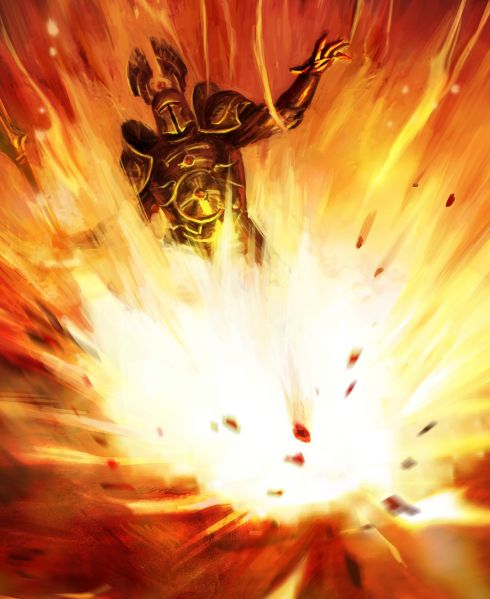Difference between revisions of "Fire Trap (spell)"
Tao alexis (talk | contribs) |
Tao alexis (talk | contribs) |
||
| Line 11: | Line 11: | ||
| level = [[Druid 2nd Level Spells|druid (2nd)]] | | level = [[Druid 2nd Level Spells|druid (2nd)]] | ||
}} | }} | ||
| + | __TOC__ | ||
| + | The explosive discharge causes no harm to the trapped object or its contents. However, any creatures handling the object suffer damage equal to 1d4 [[Hit Points|hit points]] per [[Experience Level|level]] of the caster. Those affected make a [[Saving Throws|saving throw versus a breath weapon]]; a successful save halves the damage, disregarding any fractions. Additionally, all items worn or carried on the front of the affected creature's upper body make [[Saving Throws for Items|save vs. normal fire]]. | ||
| + | The spellcaster can create one new fire trap each day, with a maximum limit of 1 trap per level. If the caster exceeds this limit, the earliest fire trap created by the caster is dispelled. | ||
| + | == Use as a Grenade == | ||
| + | Fire-trapped objects can be carried and handled without difficulty so long as they're not dropped. A dropped fire-trap bomb may affect the caster as well as anyone else — which is also true if a caster carrying such a device is affected by an unexpected crushing blow of some kind. | ||
| + | |||
| + | When used as a thrown weapon, Fire-trapped objects with a catch-lid are highly likely (19 out of 20) to open and explode upon impact. Stoppered ceramic or glass containers | ||
| − | |||
| − | |||
| − | |||
Fire trapped objects can be carried and handled without difficulty, so long as they're not dropped. If the trap is thrown, objects with a catch-lid are likely (19 out of 20) to open and explode. Ceramic or glass containers must make save vs. a crushing blow if hurled. | Fire trapped objects can be carried and handled without difficulty, so long as they're not dropped. If the trap is thrown, objects with a catch-lid are likely (19 out of 20) to open and explode. Ceramic or glass containers must make save vs. a crushing blow if hurled. | ||
Revision as of 17:41, 25 October 2023
Fire trap is a spell that converts any object with the capability to open and close, such as a book, box, bottle, chest, coffer, coffin, drawer, door or similar item into a perilous trap. This transformation only works on objects that are in a closed state at the time the spell is cast. Subsequently, if anyone other than the caster attempts to open it, the trap triggers, erupting in flames and causing damage. The caster, however, can open and close the object without setting off the trap, and the object remains fire-trapped during this period.
| Range | touch |
| Duration | until discharged; see text |
| Area of Effect | 1 object |
| Casting Time | 1 round |
| Saving Throw | ½ damage if save |
| Level | druid (2nd) |
The explosive discharge causes no harm to the trapped object or its contents. However, any creatures handling the object suffer damage equal to 1d4 hit points per level of the caster. Those affected make a saving throw versus a breath weapon; a successful save halves the damage, disregarding any fractions. Additionally, all items worn or carried on the front of the affected creature's upper body make save vs. normal fire.
The spellcaster can create one new fire trap each day, with a maximum limit of 1 trap per level. If the caster exceeds this limit, the earliest fire trap created by the caster is dispelled.
Use as a Grenade
Fire-trapped objects can be carried and handled without difficulty so long as they're not dropped. A dropped fire-trap bomb may affect the caster as well as anyone else — which is also true if a caster carrying such a device is affected by an unexpected crushing blow of some kind.
When used as a thrown weapon, Fire-trapped objects with a catch-lid are highly likely (19 out of 20) to open and explode upon impact. Stoppered ceramic or glass containers
Fire trapped objects can be carried and handled without difficulty, so long as they're not dropped. If the trap is thrown, objects with a catch-lid are likely (19 out of 20) to open and explode. Ceramic or glass containers must make save vs. a crushing blow if hurled.
Used as a grenade, the caster chooses a target to throw at; this may be a creature or it may be specific combat hex — if the latter, then only "grenade" damage is caused. The caster rolls a d20 to hit, needing to achieve armour class (AC) 10 to hit the desired target. In the case of a hit, "direct" damage is delivered to the target; those within 2 combat hexes of the target take grenade damage. If a miss occurs, then the caster needs to roll a d6 to determine which random hex around the target hex was hit, determining who receives grenade damage. There is no splash damage.
Coupling with Other Spells
A fire trap functions excellently when used in tandem with spells like wizard lock or hold portal. A knock spell sets off a fire trap.
